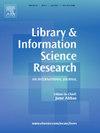How user information search patterns impact learning outcomes across different stages of learning-related search tasks
IF 2.3
3区 管理学
Q2 INFORMATION SCIENCE & LIBRARY SCIENCE
引用次数: 0
Abstract
As information search increasingly becomes a means of knowledge acquisition, improving user learning outcomes has become critical for users and search engines. To identify search patterns that lead to high learning outcomes, fuzzy-set qualitative comparative analysis (fsQCA) was used to analyze data collected from a lab experiment. Six search patterns that optimize learning were proposed: active engagement, time-intensive exploration, sophisticated and efficient, simple and efficient, extensive querying, and comprehensive browsing. Users dynamically adopt these search patterns depending on their task cognitive level (receptive and critical) and search stage (early, middle, and late). By examining how interactions among variables affect learning outcomes, the limitations of traditional variance- and regression-based methods that examine the independent effects of single factors were overcome. This research pioneers the use of fsQCA in search as learning (SAL) studies, provides novel insights into the interplay of search behaviors and uncovers multiple configurational pathways to learning success.
用户信息搜索模式如何影响学习相关搜索任务的不同阶段的学习结果
随着信息搜索日益成为知识获取的一种手段,提高用户的学习效果对用户和搜索引擎来说都变得至关重要。为了确定导致高学习效果的搜索模式,使用模糊集定性比较分析(fsQCA)来分析从实验室实验中收集的数据。提出了六种优化学习的搜索模式:主动参与、时间密集型探索、复杂高效、简单高效、广泛查询和全面浏览。用户根据他们的任务认知水平(接受性和批判性)和搜索阶段(早期、中期和后期)动态地采用这些搜索模式。通过研究变量之间的相互作用如何影响学习结果,克服了传统的基于方差和回归的方法在检查单个因素的独立影响方面的局限性。本研究开创了fsQCA在搜索学习(SAL)研究中的应用,为搜索行为的相互作用提供了新的见解,并揭示了学习成功的多种配置途径。
本文章由计算机程序翻译,如有差异,请以英文原文为准。
求助全文
约1分钟内获得全文
求助全文
来源期刊

Library & Information Science Research
INFORMATION SCIENCE & LIBRARY SCIENCE-
CiteScore
4.60
自引率
6.90%
发文量
51
期刊介绍:
Library & Information Science Research, a cross-disciplinary and refereed journal, focuses on the research process in library and information science as well as research findings and, where applicable, their practical applications and significance. All papers are subject to a double-blind reviewing process.
 求助内容:
求助内容: 应助结果提醒方式:
应助结果提醒方式:


